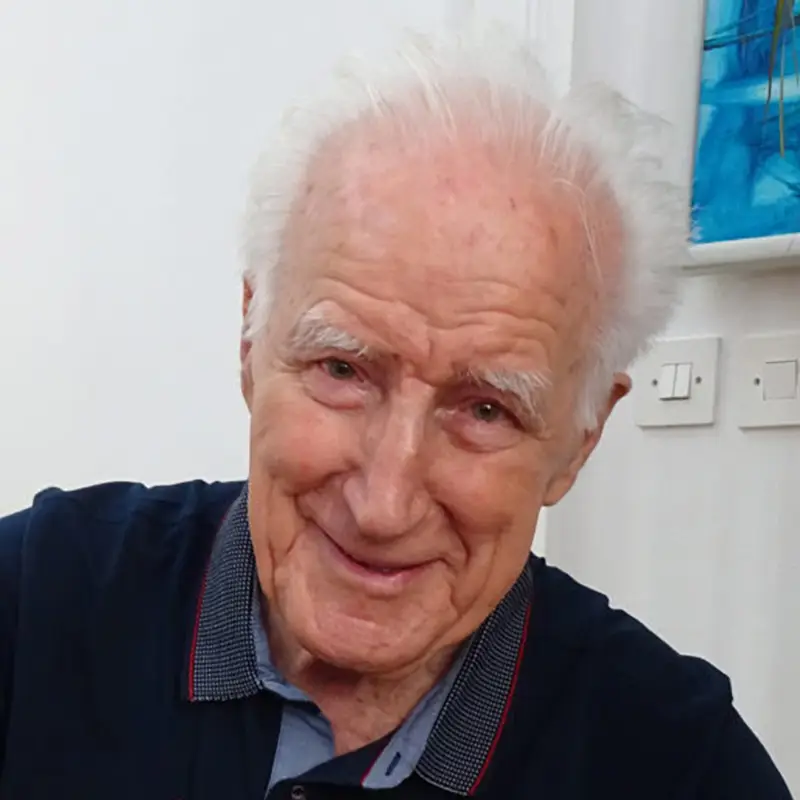Dr Boris Cibic
Vice-president of the Slovenian Heart Foundation
Italy / Slovenia

I was born in 1921 in Prosecco (Prosek), the province of Trieste, Italy, into a large family. My father was a farmer and my mother knew a lot about herbal remedies which could cure any illness in the family. None of us had health insurance and the closest family doctor was five kilometres away. Schoolchildren were regularly vaccinated and any epidemic was stopped in its track. Births, which all occured at home, were assisted by very experienced woman. The first sulfa drugs arrived around 1935 and antibiotics and other drugs we still use today (aspirin, etc.) in 1945.
During the Second World War our family experienced significant economic consequences as a result of illness and the loss of male relatives. In my case, I was the only one in the family who happily accompanied my mother on her walks through the fields, looking for plants and roots that were used in folk medicine. When I finished high school (1940), I registered to the Faculty to Medicine at the University of Padova, but for political reasons I was unable to attend until the end of the war.
After being away from home for nearly five years, I returned in the summer of 1945 and decided to move to Ljubljana, Yugoslavia, to restart studies in Medicine and finished in 1950. This was followed by five years at the Institute of Pathophysiology at the Faculty of Medicine of Ljubljana and then 35 years in the Medical Clinic of the University of Ljubljana, in the department of Cardiology and Hypertonology.
When I was 70 I retired and have then continued to work on a voluntary basis at the Slovenian Heart Foundation (Društvo za zdravje srca in ožilja Slovenije), a foundation to which I have given all my energy for many years. I volunteered in a number of programmes – setting up local groups of Heart Foundation around the country and organizing exhibitions about cardiovascular diseases in multiple cities (once in partnership with the Austrian Heart Foundation) with great success.
Our first and longest exhibition was held in Ljubljana and lasted three months, with a large number of posters including explanations in Slovenian and presentations of devices used in cardiology. We measured many important cardiological parameters in visitors. Thousands of people attended, including many pupils, and the event was very successful. Our exhibitions were held regulary in years 1993-2000 and are still well remembered!
I am very proud of everything that we have accomplished and still continue to accomplish in collaboration of cardiologists, family doctors, pupils, students, sports societies and others from all over of Slovenia. Unfortunatelly for health reasons and my age (98 years) I’m not able to participate in our partners’ congresses any more, but on behalf of the Heart Foundation I regularly respond on the phone to people with cardiology and hypertonology therapy problems, and also collaborate on papers for our association’s journal Za srce (“For the heart”). I am also always happy to help those who come to our office and want to speak with me in person. My Latin teacher taught me the saying repetita juvant (“repeating does good”) and this is what I do every day when I talk to my patients.
Of the founders of our “Heart Foundation” (1991), I am the only one still operative. Our team is very active, led by the new President Dr Matija Cevc, who works in the cardiovascular clinic in Ljubljana.
Like foundations in the rest of the world, we are short in finance. There’s a law in Slovenia that encourages banks and companies to support non-profit organizations and there are also many programmes carried out by the Ministry of Health, Ministry of Education and other political structures to fight chronic diseases.
Slovenia is a small country (just two million people) so it’s possible to reach every inhabitant of Trieste, Nova Gorica, Koper, Postojna and the surroundings.
I have been alive for such a long time that I can clearly see the huge difference between the wellbeing of citizens today and that of 70 years ago. Therefore I am optimistic. According to European data, people are more and more likely to follow the advice of experts and doctors on how to live in order to stay healthy throughout their lives focusing on phisical and mental activity, body weight, diets with less salt but rich in fiber, fruits and vegetables.